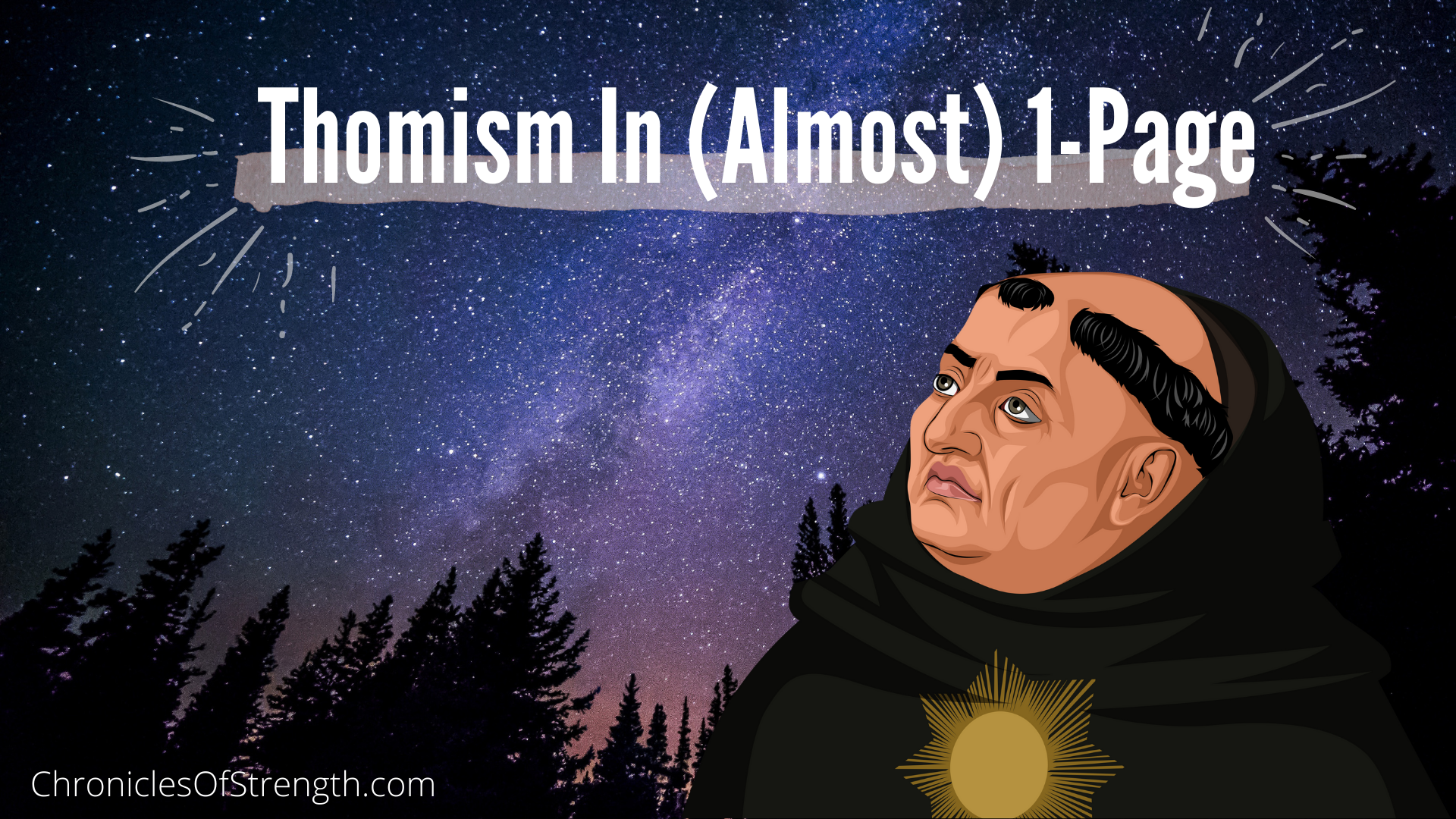
Thomism In (Almost) 1-Page
Thomism (aka the philosophy of St. Thomas Aquinas) holds that the universe is made up of a hierarchy of diverse grades of being – from elements to plants to humans to angels – all of which are dependent upon the non-contingent absolute, self-subsistent being (God) who creates, sustains, and moves everything else which exists in accord with their nature. Further, that man himself is a microcosm within a macrocosm being a union of matter (body) and spirit (mind) which is the substantial but immaterial form of the body and destined for life after death. Man by nature desires to know reality and its highest truths and deepest causes (that is, ultimately, to know God) but this possibility stretches beyond this life and man’s natural capacities: thus, if man is to attain eternal happiness, he must be instructed by a divine faith that transcends philosophy, and his actions must be guided by a divine love that builds on and perfects nature through divine grace.[1]
Thomism (as I see it) is not an utterly distinct system of thought but a synthesis – a culmination, if you will; always under development and refinement – of perennial philosophy; that is, true philosophy, as distinguished from sophism. At its core, Thomism gets reality right: It is, as G.K. Chesterton pointed out, the closest philosophy to what the man in the street believes. In other words, Thomism seeks to explain, rather than explain away, the human experience. And even if in affirming what we might call “common sense” Thomism must deploy technical equipment that requires years of training to understand, Thomism (at the end of the day) gives us reality as reality commonly seems to be, and by that I mean the following:
1) That essences are real and knowable. That is, there are such things as “human nature,” “acorn nature,” “dog nature,” etc., and that through scientific undertaking we can come to understand what these things are (however imperfectly), how they operate under certain conditions, and what their perfections entail. In other words, Thomism is anti-nominalist.
2) That ideas (i.e. perception) are, primarily, that through which, and not that which, we apprehend. In other words, we have contact with a world beyond our heads and our cognitive powers are generally reliable even if they are not infallible. In other words, Thomism is anti-idealist and anti-skeptical.
3) That morality is a rational enterprise discerned by recognizing human nature (and its perfection) while finding ultimate intelligibility as a finite participation in divine wisdom and goodness, as such. In other words, Thomism is anti-relativist and anti-nihilist.
4) That all beings have an intelligible principle of configuration (formal cause, or essence); that all beings are naturally ordered toward some effect or range of effects which fulfill them (final cause, or teleology); that beings of finite modes of existence are caused by something extrinsic to themselves (efficient cause) and are typically made of underlying constituent parts (material cause). In other words, Thomism is anti-reductionist and anti-materialist.
Note: The traditional four causes answer to different questions, such as: what a thing is and how it operates? (formal cause); what is something made of? (material cause); what enabled or enables this thing to be? (efficient cause); what is this thing for/directed toward? (final cause).
5) That God exists and is the ultimate source of intelligibility, goodness, unity, power, and love. Thomism does not start with God but finishes with God as the answer to why any finite, contingent thing exists and not nothing instead (as Lonergan says, God is the complete set of answers to the complete set of questions that can be coherently asked; God is where the principle of sufficient reason is sufficiently cashed out). In other words, Thomism is anti-atheistic.
[1] I thank Michael Torre for helping me with a summary of “Thomism in 3 sentences” and recommend his excellent introductory metaphysics text What Is. I would also recommend The One and The Many, 10 Philosophical Mistakes, and (obviously) Aquinas himself.
PS – For more on Thomism and other philosophical content, see my podcast The Pat Flynn Show.